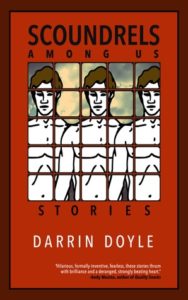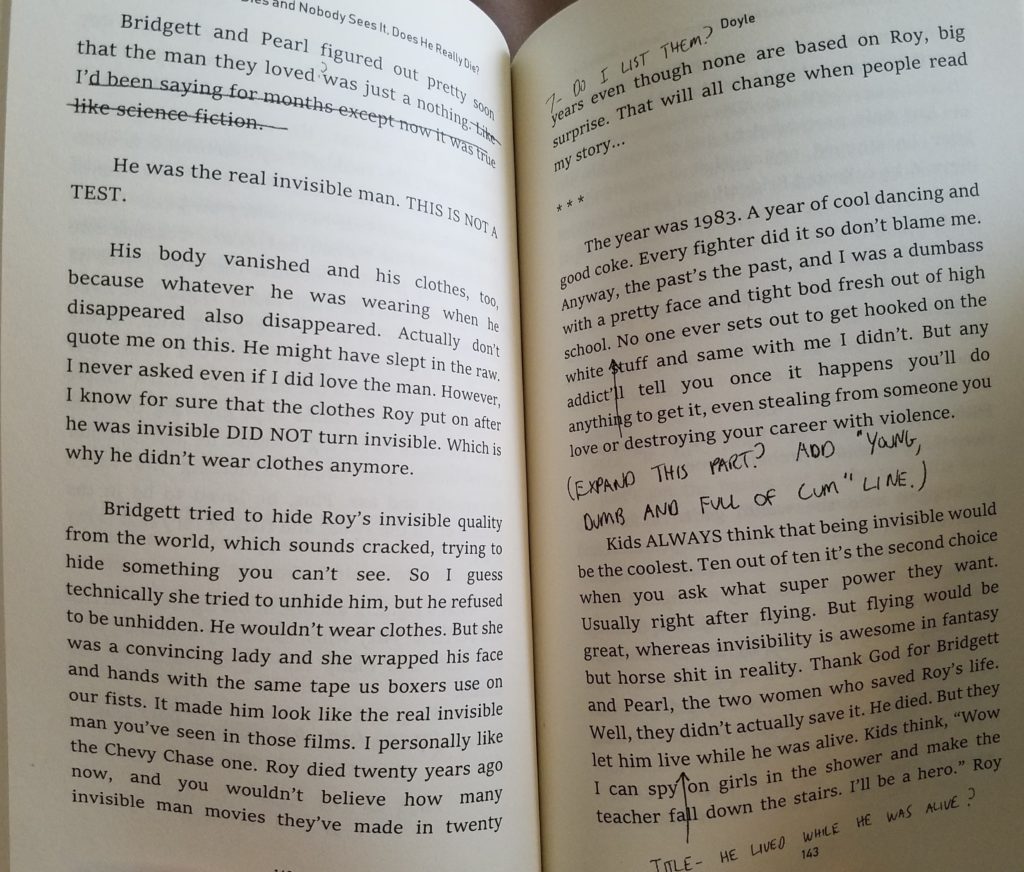Men Behaving Badly: A Review of ‘Scoundrels Among Us’ by Darrin Doyle
By Jordan Blum
Posted on

Darrin Doyle is quite an accomplished writer, having published two novels (Revenge of the Teacher’s Pet: A Love Story and The Girl Who Ate Kalamazoo), a sequence of fiction (The Dark Will End the Dark), and many individual pieces in various journals over the last decade. Couple that with his diverse history of jobs (including paperboy, pizza delivery job, janitor, door-to-door salesman, telemarketer, and janitor)—as well as his experiences living around the country and teaching English in Japan—and it’s no surprise that his latest short story collection, Scoundrels Among Us, radiates a mixture of [mostly] down-to-earth situations and eloquently refined yet quite accessible language. While not every piece in it is as conclusive, eventful, and/or impactful as it could be, they’re all at least enjoyably inventive, with a few downright enthralling entries that’ll stick with you long after you’ve read them.
Doyle aptly bills the book as “an electrifying look at men behaving badly—or just being weird.” Indeed, many of its strongest works concern precisely that set-up. For instance, “Engagement” finds a husband violently escalating a simple neighborhood disagreement (to the chagrin of his wife), “Slice of Moon” explores the potentially sinister nature of a seemingly innocuous loner, and the title piece is a wonderfully ludicrous and intense narrative about “a foul-mouthed posse of machete-wielding scoundrels who wreak havoc on a small-town mayor.” Likely the best inclusion (in terms of character, implication, and plot) is “Reborn,” a poignant account that mixes a crisis of faith, adultery, blind devotion, and divine consequences to great effect.
Another successful aspect of Scoundrels Among Us is its use of absurdity and ambiguity to yield meaningful allegories and maintain thematic continuity. The utmost examples are the four-part “Session” dialogues that are scattered throughout the book and find an unnamed questioner asking simple inquiries (to which the unnamed answerer gives lengthy, philosophical responses whose meanings are rarely clear but always fascinating). Elsewhere, “Dangling Joe” investigates concepts like group polarization and binary thinking in its account of how an inexplicably floating man is seen as both a blessing and a burden by observers; “Second Home” is a technological and futuristic cautionary tale a la Black Mirror; and “Party Town” offers brief but powerful Vonnegut-esque insights into the downfall of a society in which self-preservation, responsibility, and intellectualism are eschewed in favor of immorality and careless instant gratifications:
Nobody was sure, or could remember, where their food came from, or why they had power in their homes or gasoline in their cars, or whom to thank for the endless supply of wine, beer, and spirits. Whenever the topic came up, they would shrug and say, Who the hell cares? The less they thought about stuff like this, the better.
(A special nod must be given to “If the Invisible Man Dies and Nobody Sees It, Does He Really Die?” which uses creative, downright meta stylistic tricks to put readers in the mind of a writer crafting a story about “a second-rate boxer [who] starts a torrid affair with the wife of the Invisible Man—who just might be watching (and enjoying) all the freakiness.” See the sample below.)

Although Scoundrels Among Us does have plenty of commendable ideas and approaches, it does suffer from abrupt endings (including “Engagement”) and seemingly insubstantial/superficial stories from time to time. Sure, they’re all pleasing enough as they go, but additions like “A Four-Letter Word for Exchange,” “A Fine Time,” “Twilford Baines, Buck Hunter Unbounded,” and “Snow, Lightly Falling”—among others—don’t expose a strong enough purpose and/or resolution when all is said and done. In other words, you’ll be left thinking, Okay, I sort of got the point of that, but not much happened and not much is left for me to remember and contemplate.
Despite those issues, Scoundrels Among Us is a majorly imaginative, evocative, and rewarding read. By using welcoming yet graceful language to tell is surprising tales (both abstractly prophetic and casually entertaining), Doyle reveals himself as a skilled storyteller whose mastery of blending of valuable messages, deep characters/situations, and sophisticated writing is a definite asset to the world of modern fiction.